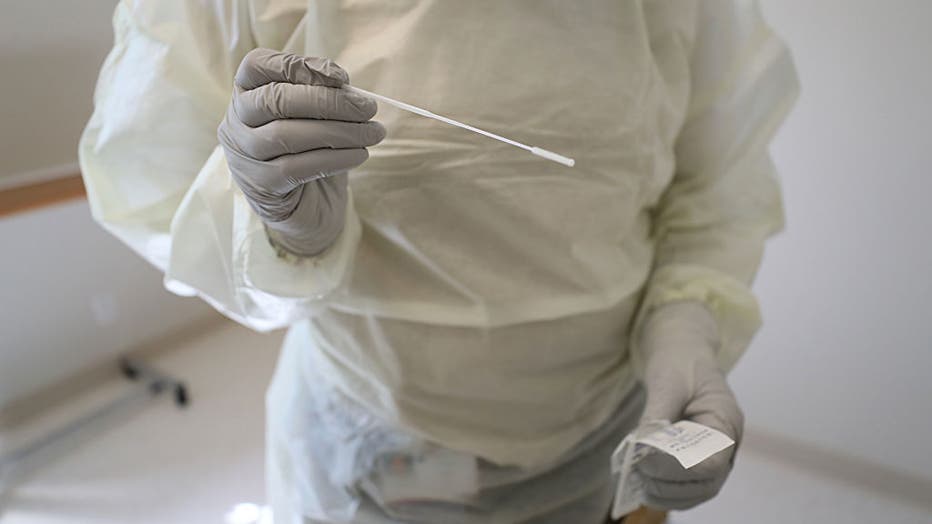As vaccinations expand, finding COVID-19 testing might be becoming harder

COVID-19 testing declines as vaccines increase
Testing has started to take a backseat to COVID-19 vaccinations.
ATLANTA - Across the US, mass COVID-19 testing sites have become mass vaccinations sites.
It is a shift in priorities Arizona State University professor and Rockefeller Foundation advisor Mara Aspinall says makes sense.
"The key word here is balance," Aspinall says. "We clearly need to get shots into arms. But, at the same time, we cannot let up on testing."
The Centers for Disease Control & Prevention recommends PCR, or molecular, testing for people who have symptoms of the virus or who have had close contact with someone with a confirmed COVID-19 infection.
The agency says anyone who has traveled, attended a large gathering or been in a crowded indoor setting should also be screened for the virus.
Aspinall says testing can confirm infections in people who are symptomatic and pick up on infections that may otherwise be missed in those who feel well.
"Probably two-thirds of people who are infected with this disease are totally without symptoms," Aspinall explains "So, testing, particularly for those who have no symptoms, but have had exposure, or are just in and around the world, or are just out and about, it's critical to understand if they can transmit the disease."

NEWTON, MA - SEPTEMBER 8: A swab is unwrapped at the Newton Wellesley Hospital COVID-19 testing site in Newton, MA on Sept. 8, 2020. (Photo by Suzanne Kreiter/The Boston Globe via Getty Images)
RELATED: 6 feet or 3 feet? Schools, CDC considering guidance on seating students closer together
The challenge, Medical College of Georgia Vice Chairman of Pathology Dr. Ravindra Kolhe says, is that the US has limited resources to fight the pandemic.
"And, the exact same resources are being used to do both vaccinations and testing, especially on the front end," Kolhe says.
Once a significant number of Americans have been vaccinated, Kolhe believes how and where we screen for the virus will change.
"The testing will be definitely shifted to an outpatient setting, for example, when you go and see your primary care physician, or a home care setting," Kolhe says. "So, I think those two fronts are going to be very critical for testing."
Aspinal says four at-home testing kits have been authorized by the Food and Drug Administration.
"It's important to differentiate between these (kits) and at-home collection kits, where somebody swabs at home, sends it in and waits two days for the answer," she says. "These are tests that are started at home, collected at home, and you get the answer yourself at home."

Georgia COVID-19 vaccine distribution update
Gov. Brian Kemp and state officials give an update on COVID-19 vaccine distribution in Georgia, Tuesday March 16, 2020. The governor discussed the next group eligible to receive the vaccine and when he expects the vaccine to be available to all Georgians.
RELATED: Judges and courtroom staff eligible for COVID-19 vaccine, governor says
Both Aspinall and Kolhe testing will be key in keeping tabs on the spread of new, more transmissible strains of the coronavirus.
CDC Director Dr. Rochelle Walensky told reporters Monday the B 117 variant, which emerged in the UK in the fall, has now been detected in 50 states and territories.
Dr. Walensky says it could become the dominant strain circulating in the US by late March or early April.
Dr. Kohle says he is already thinking about post-vaccination testing, and how scientists will track these new variants in the months and years to come.
"We can't just take our hands of the wheel," Kohle says. "We'll have to be testing not only for positive or negative, but I think each and every case. Each positive case needs to be sequenced to identify the circulating variants."
Aspinall says it is important to make sure we have the right balance.
"Keep up the focus on vaccinations," she says. "But, let's not stop the focus on asymptomatic as well as symptomatic testing."
WATCH: FOX 5 Atlanta live news coverage
_____
Sign up for FOX 5 email alerts
Download the FOX 5 Atlanta app for breaking news and weather alerts.

